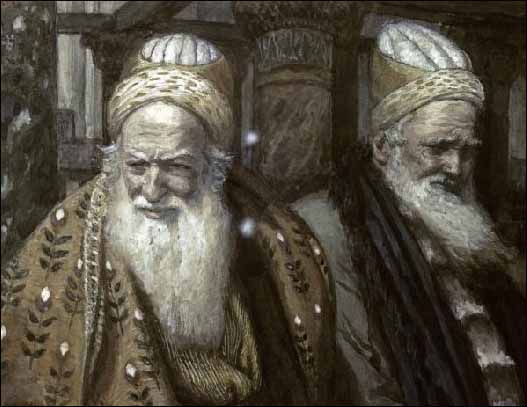The Seven Sons of Sceva the High Priest

Acts 19:14 tell us about the seven sons of a “Jewish High Priest” by the name of “Sceva”. If one looks down the list of high priests, there is not a high priest in Jerusalem named “Sceva”. Biblical commentators resolve this discrepancy by stating that Sceva must have been a Jewish man who became a pagan “high priest”. I’m not ruling that out, but I find it very unlikely.
The reason for this is that the name “Sceva” is a Hellenized version of the Latin word scaeva meaning “left-handed” and by extension, “sinister” and “untrustworthy”. Lewis & Short’s Latin Dictionary also attests to a classical meaning of “perverse” or “ominous”.
If Luke is engaging in priesthood polemics by contrasting the priesthood of Christ with that of the Jewish high priesthood, then we have a clue to what is meant by “Sceva”.
[Incidentally, I’m becoming convinced that Luke is the author of Hebrews since: A) Luke is very Pauline; B) Luke-Acts is caught up in priesthood polemics; and C) Hebrews is a priesthood polemic par excellence. If you think all this is strange, Thomas Aquinas backs me up as he thinks Luke had a hand in Hebrews, as well.]
So which high priest is “Sceva”? My suspicion is Caiaphas, but I don’t know. I wonder if “seven sons” literally refers to sons. The seven sons “leave the house” wounded and naked. This is a sign of unworthiness. They attempt exorcism without the name of “Jesus” or “Paul” and the demons tear them up for it. The whole point is that although sons of the “chief priest”, they have no authority over devils. Their priestly power is nothing compared to that of Jesus Christ.
It would be interesting to discover whether any high priests had connections to Ephesus. That might provide a hint as to the identity of Sceva.
Also, if Luke is writing to the high priest Theophilus, Theophilus surely would know who this “Sceva” is who had “sons” in Ephesus.
Comments?

Acts 19:14 tell us about the seven sons of a “Jewish High Priest” by the name of “Sceva”. If one looks down the list of high priests, there is not a high priest in Jerusalem named “Sceva”. Biblical commentators resolve this discrepancy by stating that Sceva must have been a Jewish man who became a pagan “high priest”. I’m not ruling that out, but I find it very unlikely.
The reason for this is that the name “Sceva” is a Hellenized version of the Latin word scaeva meaning “left-handed” and by extension, “sinister” and “untrustworthy”. Lewis & Short’s Latin Dictionary also attests to a classical meaning of “perverse” or “ominous”.
If Luke is engaging in priesthood polemics by contrasting the priesthood of Christ with that of the Jewish high priesthood, then we have a clue to what is meant by “Sceva”.
[Incidentally, I’m becoming convinced that Luke is the author of Hebrews since: A) Luke is very Pauline; B) Luke-Acts is caught up in priesthood polemics; and C) Hebrews is a priesthood polemic par excellence. If you think all this is strange, Thomas Aquinas backs me up as he thinks Luke had a hand in Hebrews, as well.]
So which high priest is “Sceva”? My suspicion is Caiaphas, but I don’t know. I wonder if “seven sons” literally refers to sons. The seven sons “leave the house” wounded and naked. This is a sign of unworthiness. They attempt exorcism without the name of “Jesus” or “Paul” and the demons tear them up for it. The whole point is that although sons of the “chief priest”, they have no authority over devils. Their priestly power is nothing compared to that of Jesus Christ.
It would be interesting to discover whether any high priests had connections to Ephesus. That might provide a hint as to the identity of Sceva.
Also, if Luke is writing to the high priest Theophilus, Theophilus surely would know who this “Sceva” is who had “sons” in Ephesus.
Comments?
What to Watch Next
SHOP THE TAYLOR MARSHALL STORE
Dive Deeper

GET CONFIDENT IN YOUR FAITH
Explore the fascinating world of Catholic teachings with Dr. Marshall. Together you’ll unpack the brilliant answers the Church gives to tough questions about the Faith. The best part: you go at your own pace. Start this exciting journey today.


 >
>


